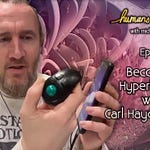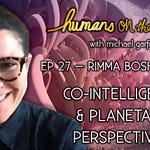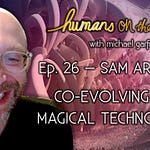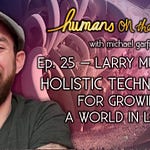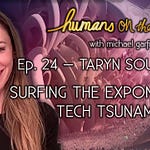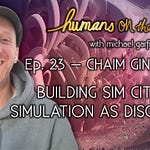Sean Esbjörn-Hargens is one of the sharpest and most insightful people I know, and an globally-recognized expert and pioneer in the emerging meta-discipline of integral theory and practice.
The former chair of John F. Kennedy University’s Integral Studies department, co-author (with Michael Zimmerman) of Integral Ecology, co-founder (with Mark Forman) of the international Integral Theory Conference, and now in his post-academic life, head of MetaIntegral a training and consulting company specializing in the design of wisdom economies.
“Expand your story! Expand your position! Expand your sense of self identity as to what you’re doing and why. Because you’re already doing it.”
Become conscious of the value and benefits you’re already providing the world – and then amplify that – by digging this great conversation…
http://metacapital.net/iceland-seminar/
https://integrallife.com/integral-ecology-uniting-multiple-perspectives-natural-world/
https://www.amazon.com/Integral-Ecology-Uniting-Multiple-Perspectives/dp/1590307674
Subscribe to this show: Apple Podcasts • Stitcher • Spotify Join our Facebook Discussion Group
(Cover painting by David Titterington.)
We Discuss:
• Sean’s early interest in the scientific study of animal consciousness: philosophy, biology, AND psychology
• The intersection of human consciousness, worldviews, and values systems – and how nature appears differently to everyone
• Discovering Ken Wilber’s integral philosophy and its critiques of the retro-romantic “Back to the Garden” ideology of deep ecology and eco-feminism
• How many different approaches to the natural world are there?
• The problem of academia’s failure to properly accommodate trans-disciplinary, meta-disciplinary, synthetic, integral thought
• Economy as a sub-category of Ecology
• The Complexity Gap: the gap between our level of consciousness and our ability to manage complexity on one hand, and the amount of complexity we find ourselves in, on the other
• Simplicity on the other side of complexity: moving ecological and integrative thinking into business and organizational development
• What is Meta-Capitalism?
• Beyond the reductionism of triple bottom line thinking: purpose
• Integrating the sentience of other organisms into our understanding and practice of ecology
• Bringing the inner worlds of the first-person and second-person back into science and organizational development: experience, emotion, mutual understanding, and purpose
• Taking multiple perspectives on wealth, value, and the many forms of capital: not just the external metrics but the feelings and experiences of wealth, poverty, and power inequality
• How to teach organizations to see the value they’re already generating – and unaware of – so that they can serve a larger population with a clearer identity and more coherent actions
• The emergence of value-accounting software that can help us track impact across the myriad domains of capital
• Organizational coaching as collective shadow work and a kind of psychedelic therapy at the level of the group
• Making subject object: making perspectives an object of awareness and moving from experience to insight in meditation, coaching, and any area of personal or collective transformation
• Anchoring integration in the heart and gut – not just the brain, but really letting understanding sink and ripen in our feelings and our flesh and blood
• How learning to play the violin and sing at the same time can be a profound somatic practice of meta-level integration
• Dance and martial arts practices as a complement to being super heady…differentiating and integrating the body and developing an “eco-somatics” for moving consciously in the world
Select Quotes:
“It’s really only at the limits of the postmodern orientation that you begin to see the importance of integration. So as a culture and as a global society, we’re just now really entering into an integrative mode where the overwhelm of the information is forcing us to adapt strategies of integration.”
“More and more of our challenges and issues require some mode of integrative thinking and action.”
“There are lots of different kinds of value, and if you leave out one kind, you’re really doing a disservice to reality. It’s actually a violence against the cosmos.”
“Environmental rah-rah really serves a purpose, but until we really wrestle with capitalism, it’s almost like, ‘What’s the point?’”
“It’s more a clash of worldviews than it is a clash of facts. And how different worldviews relate to those facts.”
“How would our science of ecology change if we actually recognize the sentience of the organisms that are part of that ecology?”
“The resistance is good because it shows that you’re in the right ballpark. You want there to be resistance. I don’t really waste my time trying to convince anyone of anything. I try and work with people where there’s at least a basic level of interest, and then work with the resistance they have.”
“Things are going to get more fragmented, and things are going to get more integrated. And those two things paradoxically exist side by side.”
“Fragmentation usually has a negative connection because we think of it as dissociation. But if we think of fragmentation as differentiation, and we think of differentiation and integration, those two things go hand in hand developmentally.”
“Working with the meta-impact framework is, in a sense, doing shadow work for an organization.”
“I really want my life to be the transmission of integrated head, heart, and hara.”
Support this show http://supporter.acast.com/futurefossils.
Hosted on Acast. See acast.com/privacy for more information.



